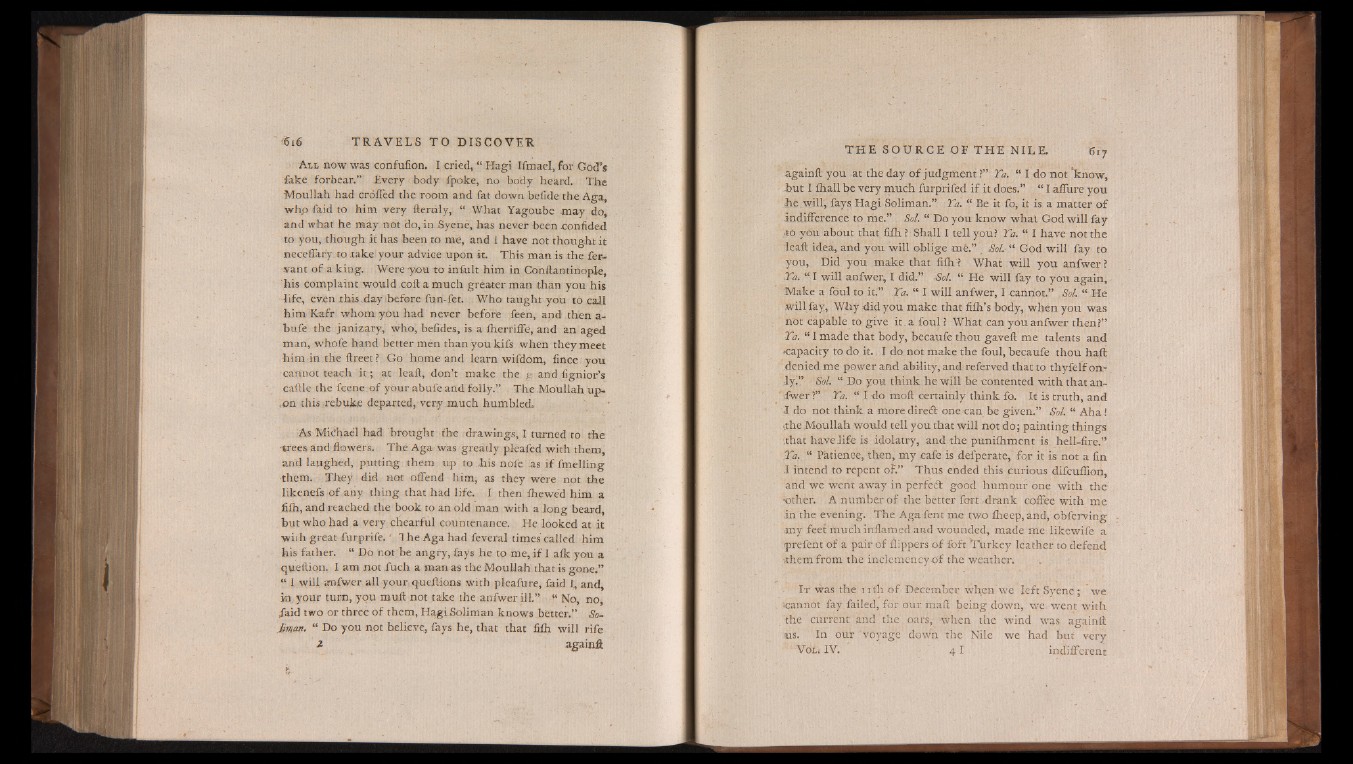
A l l now was confufion. I cried, “ Hagi Ifmael, f o r Cod’*
fake forbear.” Every body fpoke, no body heard. The
Moullah had croffed the room and fat down beilde the Aga.,
whp faid to him -very fternly, “ What Yagoube m a y do,
and what he may not do, in .Syene, has never been confided
to you, though it has been to me, and 1 have not thought it
neceffary to .take your adviGe upon it. This man is the fer-
yant o f a king. Were -you to infult him in Conftantinople,
his complaint would coft a much greater m an than you his
life, even this day before fun-fet. Who taught you to call
him Kafr whom you had never before feen, and then a-
bufe the janizary, who, befides, is a iherriffe, and an aged
man, whofe hand better men than you kifs when they meet
him in the ftreet ? Go home and learn wifdom, fince you
cannot teach i t ; at leaft, don’t make the a and fignior’s
caftle the fcene o f your abufe and folly.” The Moullah up-
,on this .rebuke departed,-very much humbled.
As Mic'hael had brought the drawings, I turned to the
-trees and flowers. The Aga was greatly pleafed with them,
and laughed, putting them up to -his nofe .as i f fmelling
them. They did not offend him, as they were not the
likenefs o f any thing that had life. I then ihewed him a
fiih, and reached the book to an old man with a long beard,
but w ho had a very chearful countenance. He looked at it
•with great furprife .' 1 he Aga had feveral times'called him
his father. “ Do not be angry, fays he to me, i f i alk you a
quellion. I am not fuch a man as the Moullah that is gone.”
“ I w ill ¿mfwer all your queftions with pleafure, laid I, and
ki your turn, you muft not take the anfwer ill.” “ No, no,
faid two or three o f them, HagiSoliman knows better.” So-
Inr.an. “ Do you not helieve, fays he, that that fiih will rife
i againil
againil you at the day o f judgment ?” Ta. “ I do not 'know,
b u t I ihall be very much furprifed i f it does.” “ I affure you
h e will, fays Hagi Soliman.” Ta. “ Be it fo, it is a matter o f
indifference to me.” Sol. “ Do you know what God w ill fay
-to you about that fiih ? Shall I tell you? Ta. “ I have not the
leaft idea, and you w ill oblige me.” S o l “ God will fay to
you, Did you make that fiih? What w ill you anfwer?
Ta. “ I will anfwer, I did.” *Sol “ He w ill fay to you again,
Make a foul to it.” Ta. “ I will anfwer, I cannot.” Sol. “ He
will fay, Why d id you make that fiih’s body, when you was
not capable to give i t .a foul ? What can you anfwer then?”
Ta. “ 1 made that body, becaufe thou gaveft me talents and
■capacity to do it ., I do not make the foul, becaufe thou haft
denied me power and ability, and referved that to thyfelf only
.” Sol. “ Do you think he w ill be contented with thatan-
ifwer ?” Ta. “ I do moil certainly think fo. It is truth, and
1 do not think a more d ireft one can be given.” Sol. “ A h a !
ithe Moullah would tell you that will not do; painting things
-.that have life is idolatry, and the punifhment is hell-fire.”
Ta. “ Patience, then, my cafe is defperate, for it is not a fin
I intend to repent of." Thus ended this curious difcuifion,
and we went away in perfeft good humour one with the:
■other. A number o f the better fort drank coffee with me
in the evening. The Aga fent me two fheep, and, obferving
m y feet much inflamed and wounded, made me likewife a
prefent o f a pair o f flippers o f foft T u rk e y leather to defend
■them from the inclemency o f the weather.
I t w a s the n th o f December when’we left Syene; "w e
'•cannot fay failed, for our mail being down, we went with
the current and the oars,- when the wind was againil
•us. In our voyage down the Nile w e had but very
V o l .- IV. 4 1 indifferent